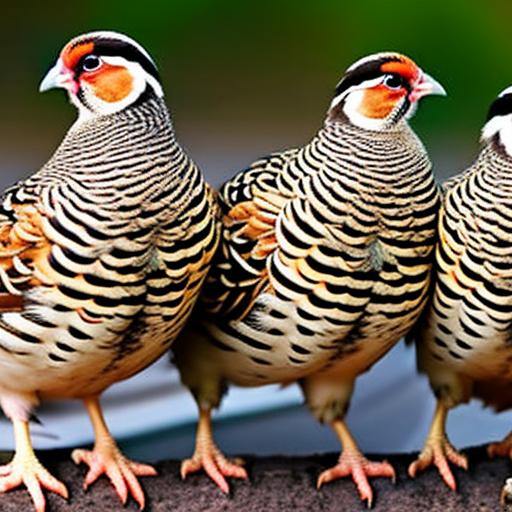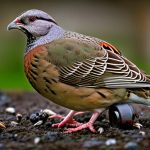Chinese quails, also known as button quails, are small, ground-dwelling birds that are native to East Asia. They are popular among bird enthusiasts and make great pets due to their small size and low maintenance requirements. Chinese quails are known for their colorful plumage and distinctive markings, making them a visually appealing addition to any aviary or household. These birds are social creatures and thrive in pairs or small groups, making them a great choice for those looking for a companion pet. Chinese quails are also known for their unique vocalizations, which can add a charming ambiance to any living space. Overall, Chinese quails are delightful and fascinating birds that can bring joy and entertainment to their owners.
Chinese quails are relatively easy to care for and can adapt well to a variety of living environments. They are hardy birds that can thrive in both indoor and outdoor settings, making them a versatile pet option for bird lovers. With the right housing, diet, and care, Chinese quails can live long and healthy lives, providing companionship and enjoyment to their owners. Whether you are a seasoned bird enthusiast or a first-time pet owner, Chinese quails can make a wonderful addition to your home and family.
Key Takeaways
- Chinese quails are small, social birds that make great pets for bird enthusiasts.
- Chinese quails require a spacious enclosure with proper ventilation and access to natural light.
- A balanced diet for Chinese quails includes a mix of seeds, grains, and fresh greens.
- Regular health check-ups and access to a qualified avian veterinarian are essential for the well-being of Chinese quails.
- Chinese quails are social animals that thrive in pairs or small groups, and they enjoy interacting with their human caregivers.
Housing and Enclosure Requirements for Chinese Quails
When it comes to housing Chinese quails, it’s important to provide them with a safe and comfortable living environment that meets their specific needs. For indoor housing, a spacious cage with a solid bottom is essential to prevent injury to their delicate feet. The cage should be large enough to allow for plenty of movement and should be equipped with perches and hiding spots to mimic their natural habitat. Additionally, it’s important to provide a shallow dish of sand or dust for dust bathing, as this is essential for maintaining their plumage and skin health.
For outdoor housing, a secure aviary with a solid floor is necessary to protect Chinese quails from predators and the elements. The aviary should be spacious enough to allow for natural behaviors such as foraging and dust bathing. Providing natural vegetation and substrate can also help create a stimulating and enriching environment for these birds. It’s important to ensure that the enclosure is escape-proof and that the birds have access to clean water and shelter at all times.
Overall, whether housing Chinese quails indoors or outdoors, it’s important to prioritize their safety, comfort, and natural behaviors. By providing a suitable living environment, you can help ensure that your Chinese quails thrive and lead happy, healthy lives.
Diet and Nutrition for Chinese Quails
Proper diet and nutrition are essential for the health and well-being of Chinese quails. In the wild, these birds primarily feed on seeds, insects, and vegetation, so it’s important to replicate this diet in captivity. A high-quality commercial game bird feed can serve as the foundation of their diet, providing essential nutrients and vitamins. Additionally, offering a variety of fresh greens, vegetables, and small insects can help supplement their diet and provide enrichment.
It’s important to ensure that Chinese quails have access to clean, fresh water at all times. Water should be provided in a shallow dish or waterer that is easily accessible to the birds. It’s also important to monitor their water intake and ensure that it is free from contaminants or debris.
Overall, a balanced diet that includes a variety of seeds, insects, greens, and vegetables is essential for the health and longevity of Chinese quails. By providing a nutritious and varied diet, you can help ensure that your birds remain healthy and vibrant.
Health and Veterinary Care for Chinese Quails
Maintaining the health of Chinese quails is essential for their overall well-being. Regular observation of their behavior, appetite, and droppings can help detect any signs of illness or distress early on. It’s important to provide a clean living environment and practice good hygiene to prevent the spread of disease. Additionally, regular cleaning of food and water dishes can help prevent bacterial contamination.
In the event of illness or injury, it’s important to seek veterinary care from a professional with experience in avian medicine. Finding a veterinarian who is knowledgeable about Chinese quails can be challenging, so it’s important to establish a relationship with a qualified professional before any health issues arise. Regular check-ups can also help ensure that your birds remain in good health and receive any necessary vaccinations or preventative care.
Overall, proactive monitoring of their health, providing a clean living environment, and seeking veterinary care when needed are essential components of maintaining the health and well-being of Chinese quails.
Socialization and Interaction with Chinese Quails
Chinese quails are social birds that thrive on companionship and interaction. They are known for their playful behavior and vocalizations, making them an entertaining addition to any household. Providing plenty of enrichment in the form of toys, perches, and hiding spots can help keep these birds mentally stimulated and engaged. Additionally, spending time interacting with your Chinese quails can help strengthen the bond between you and your pets.
When handling Chinese quails, it’s important to do so gently and with care, as they are delicate birds. It’s best to allow them to become accustomed to your presence before attempting to handle them, as sudden movements or loud noises can startle them. With patience and positive reinforcement, Chinese quails can become comfortable with human interaction and may even enjoy being handled.
Overall, providing plenty of enrichment and spending time interacting with your Chinese quails can help ensure that they remain happy, healthy, and well-adjusted pets.
Breeding and Reproduction of Chinese Quails

Breeding Chinese quails can be a rewarding experience for bird enthusiasts. Before attempting to breed these birds, it’s important to ensure that you have a suitable breeding pair and a well-prepared breeding environment. A spacious nesting box filled with soft bedding material can provide a comfortable space for the female quail to lay her eggs. It’s important to monitor the breeding pair closely and provide them with privacy and security during the breeding process.
Once the eggs are laid, they should be carefully incubated in a warm and humid environment until they hatch. Providing the chicks with a safe brooding area equipped with heat lamps and proper nutrition is essential for their survival. It’s important to monitor the health and development of the chicks closely during the early stages of life.
Overall, breeding Chinese quails requires careful planning, monitoring, and attention to detail. With proper preparation and care, breeding these birds can be a fulfilling experience for bird enthusiasts.
Considerations for Keeping Chinese Quails as Pets
In conclusion, Chinese quails are delightful and fascinating birds that can make wonderful pets for bird enthusiasts of all experience levels. By providing suitable housing, a balanced diet, regular veterinary care, socialization, and proper breeding management, you can help ensure that your Chinese quails lead happy, healthy lives. Whether you are looking for a charming addition to your aviary or a low-maintenance pet for your home, Chinese quails are sure to bring joy and entertainment to your life. With proper care and attention, these small birds can become beloved companions that enrich your life for years to come.
If you’re considering keeping Chinese quails as pets, you may also be interested in creating a suitable living environment for them. One important aspect of this is providing a secure and comfortable coop. Poultry Wizard offers a helpful article on building an A-frame chicken coop (source), which can be adapted for quails. This resource provides valuable insights into creating a safe and cozy space for your quails to thrive.
FAQs
What are Chinese quails?
Chinese quails, also known as button quails, are small ground-dwelling birds native to East Asia. They are popular as pets due to their small size and colorful plumage.
What do Chinese quails eat?
Chinese quails are omnivorous and eat a diet consisting of seeds, insects, and small invertebrates. In captivity, they can be fed a commercial game bird or finch mix, supplemented with fresh greens and the occasional mealworm.
How big do Chinese quails get?
Chinese quails are small birds, typically reaching a size of 4-5 inches in length. They are about the size of a sparrow, making them suitable for keeping as pets in a small living space.
What kind of housing do Chinese quails need?
Chinese quails require a spacious enclosure with plenty of room to move around. A cage with a solid bottom and low sides is recommended to prevent injury, and a secure lid is necessary to prevent escape.
Do Chinese quails make good pets?
Chinese quails can make good pets for those who are willing to provide the proper care and attention. They are relatively low-maintenance and can be entertaining to watch, but they are not typically handled or hand-tamed like some other pet bird species.
Are Chinese quails noisy?
Chinese quails are generally quiet birds, making soft chirping and cooing sounds. They are not known for loud or disruptive vocalizations, making them suitable for apartment living.
What is the lifespan of a Chinese quail?
In captivity, Chinese quails can live for 3-5 years with proper care. Providing a balanced diet, a clean living environment, and regular veterinary check-ups can help ensure a healthy and long life for a pet Chinese quail.
Meet Walter, the feathered-friend fanatic of Florida! Nestled in the sunshine state, Walter struts through life with his feathered companions, clucking his way to happiness. With a coop that’s fancier than a five-star hotel, he’s the Don Juan of the chicken world. When he’s not teaching his hens to do the cha-cha, you’ll find him in a heated debate with his prized rooster, Sir Clucks-a-Lot. Walter’s poultry passion is no yolk; he’s the sunny-side-up guy you never knew you needed in your flock of friends!







